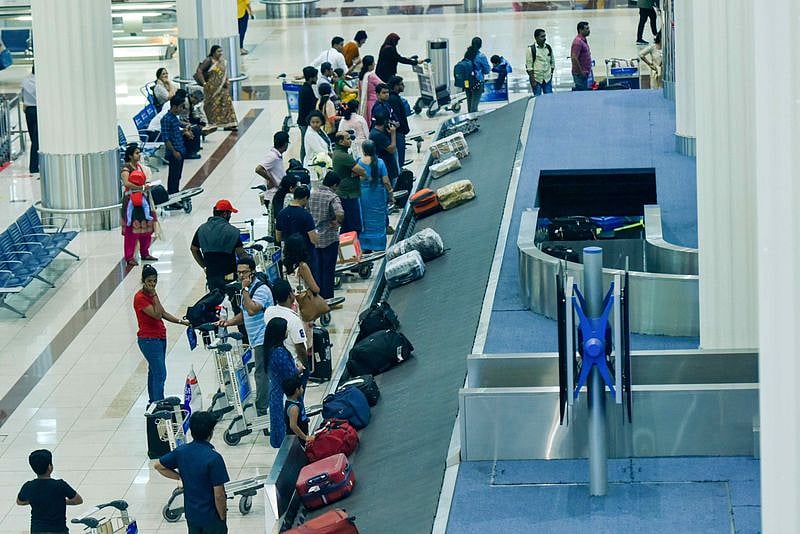Dubai's new airport is changing the baggage game; no more queues
At DWC, future passengers can even have luggage delivered to home or hotel: dnata CEO

Dubai: Passengers arriving at Dubai's new passenger terminal at Dubai World Central (DWC) can look forward to a significantly enhanced arrival experience, as luggage waits could become a thing of the past.
According to dnata CEO Steve Allen, the airport, which is currently under development, is aiming for a future where passengers won't need to queue for their bags, with luggage being ready upon arrival or even delivered directly to their homes or hotels
"We will target the best possible passenger experience, which will be fully automated, with no queues, using advanced biometrics rather than paper, so that you have a seamless journey through the airport,” said Allen.
dnata, a part of Emirates Group, is the sole air services provider for airlines operating from Dubai Airports.
Highlighting the ambitious plans for the $35 billion DWC terminal, Allen explained the revolutionary baggage handling system: “when you get off the aircraft through to the terminal, your baggage is already waiting for you, or already sent to your home or hotel.”
The expansion of DWC - Al Maktoum International, which first opened 14 years ago, aims to transform the hub into the world's busiest airport. With a planned capacity to handle 260 million passengers annually, exceeding previous projections by 100 million, the focus is clearly on creating a smooth and efficient travel experience from arrival to departure.
The innovative baggage system is a key component of this vision for a next-generation airport.
Allen said: “We can see a lot more robotics and autonomy becoming involved in aircraft turnaround.”
A futuristic airport
For example, some airports already use autonomous passenger jetties that dock automatically with the aircraft, eliminating the need for manual operation. “If we extend this to every vehicle around the aircraft, we could have autonomous baggage delivery, autonomous belts for loading bags, and even rolling mats that move bags autonomously,” said Allen, adding that dnata is working on all of these concepts.
"We are trialing autonomous baggage tractors at Al Maktoum International Airport. It’s a great test bed for new technologies because the airport has already been built.
“There's one runway and a passenger terminal in place, but there's still plenty of space to trial new things, which is critical. You don’t want to move into a new airport without testing everything you're going to use elsewhere.
“As we design the future’s equipment and passenger experience, we aim to integrate that into this airport as much as possible so it’s not entirely new. Of course, there will be some infrastructure constraints, but we’re working with that.”
According to Allen, investments are also being made to automate dnata’s cargo warehouses, which has helped the company reduce costs and increase speed.
Global expansion
In the Americas, dnata hopes to compete and thrive in the US domestic market. “We’re all watching to see what happens with global trade agreements and how that will affect the trade movement around the world,” said Allen. “For now, we’ll just wait and see.”
The company also plans to expand its presence in South America. In Europe, dnata is readying to open a cargo facility in Amsterdam by June 2025 and continues to look at expansion opportunities.
In Asia, dnata plans expansion into markets like Vietnam, Indonesia, and Malaysia. “We feel confident in these markets, having operated in the Philippines and Singapore for a long time,” said Allen. “Australia is another key market. We have some of our biggest operations in ground handling and catering there.”
War-related headwinds
For the second half of its 2024-25 financial year, dnata anticipates hitting record revenues and profitability. However, Allen said the company still needs to navigate the ongoing conflicts in the Middle East and Ukraine.
“Some recent major elections could impact trade and globalization, requiring us to adapt,” he said. Fortunately, dnata’s global diversification allows them to balance wins in some areas with losses in others, the CEO added.
“Regarding the impact of the wars on our top- and bottom-line, it has been slight. There is certainly a headwind, especially in regions like Iraq and Jordan, where airlines have had to suspend flights intermittently, affecting our operations.
“However, these regions represent relatively small parts of our business, and we have been able to adapt. On the positive side, the disruptions have resulted in increased air cargo, as some shipping lanes have been closed, which has benefited us.”
Workforce expansion
dnata currently employs some 47,800 staff globally and hopes to see a double-digit increase in its workforce over the next three years.
Network Links
GN StoreDownload our app
© Al Nisr Publishing LLC 2026. All rights reserved.